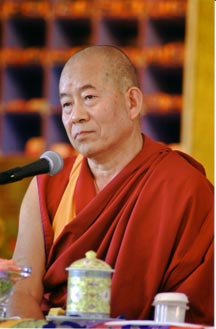Khenchen Pema Sherab Rinpoche: Difference between revisions
No edit summary |
No edit summary |
||
| Line 1: | Line 1: | ||
[[Image:Khenpo_Pema Sherab.jpg|frame|'''Khenpo Pema Sherab''']] | [[Image:Khenpo_Pema Sherab.jpg|frame|'''Khenpo Pema Sherab''']] | ||
'''Khenchen Pema Sherab''' was born in 1936, at Riphu, in the [[Dergé]] region of Eastern Tibet. He started to study at the age of eight, learning to read and write Tibetan with his uncle, Lama Chözang, while he was herding cattle. At fourteen, he went to [[Lhasa]] and studied under masters and scholars of all [[four schools|schools]] of [[Tibetan Buddhism]]. In 1953 he received ordination from [[Shechen Kongtrul Pema Drimé Lekpé Lodrö|Shechen Kongtrul Rinpoche]]. In Lhasa, he also met Kyabjé [[Dilgo Khyentse Rinpoche]] and served as his attendant for about ten years, fleeing with him to India in 1959. Over the years, he received many teachings from him, including the [[Guhyagarbha Tantra]], and [[Longchenpa]]’s ''[[Treasury of Pith Instructions]]''. | '''Khenchen Pema Sherab''' ([[Wyl.]] ''pad+ma shes rab'') was born in 1936, at Riphu, in the [[Dergé]] region of Eastern Tibet. He started to study at the age of eight, learning to read and write Tibetan with his uncle, Lama Chözang, while he was herding cattle. At fourteen, he went to [[Lhasa]] and studied under masters and scholars of all [[four schools|schools]] of [[Tibetan Buddhism]]. In 1953 he received ordination from [[Shechen Kongtrul Pema Drimé Lekpé Lodrö|Shechen Kongtrul Rinpoche]]. In Lhasa, he also met Kyabjé [[Dilgo Khyentse Rinpoche]] and served as his attendant for about ten years, fleeing with him to India in 1959. Over the years, he received many teachings from him, including the [[Guhyagarbha Tantra]], and [[Longchenpa]]’s ''[[Treasury of Pith Instructions]]''. | ||
In 1968, at the request of Kyabjé [[Penor Rinpoche]] he went to [[Namdroling Monastery]] to teach. Though the [[shedra]] was not yet established at that time, Khen Rinpoche taught the monks for several years. The shedra was finally established in 1978 and from then until 2003, for 25 years, Khenpo Pema Sherab taught there tirelessly while also managing the institution. | In 1968, at the request of Kyabjé [[Penor Rinpoche]] he went to [[Namdroling Monastery]] to teach. Though the [[shedra]] was not yet established at that time, Khen Rinpoche taught the monks for several years. The shedra was finally established in 1978 and from then until 2003, for 25 years, Khenpo Pema Sherab taught there tirelessly while also managing the institution. | ||
Revision as of 19:53, 26 June 2009

Khenchen Pema Sherab (Wyl. pad+ma shes rab) was born in 1936, at Riphu, in the Dergé region of Eastern Tibet. He started to study at the age of eight, learning to read and write Tibetan with his uncle, Lama Chözang, while he was herding cattle. At fourteen, he went to Lhasa and studied under masters and scholars of all schools of Tibetan Buddhism. In 1953 he received ordination from Shechen Kongtrul Rinpoche. In Lhasa, he also met Kyabjé Dilgo Khyentse Rinpoche and served as his attendant for about ten years, fleeing with him to India in 1959. Over the years, he received many teachings from him, including the Guhyagarbha Tantra, and Longchenpa’s Treasury of Pith Instructions.
In 1968, at the request of Kyabjé Penor Rinpoche he went to Namdroling Monastery to teach. Though the shedra was not yet established at that time, Khen Rinpoche taught the monks for several years. The shedra was finally established in 1978 and from then until 2003, for 25 years, Khenpo Pema Sherab taught there tirelessly while also managing the institution.
Writings
Among the many books he has written are a biography of Guru Padmasambhava, an exposition of the two truths, lorig and takrig, and an exposition of logic.
- dge ba'i bshes gnyen chen po thub bstan brtson 'grus phun tshogs kyi rnam thar bdud rtsi'i zegs ma, Namdroling, 1987
Further Reading
- Dilgo Khyentse Rinpoche, Brilliant Moon, Shambhala, 2008, Chapter 15. Fleeing over the Mountains by Khenpo Pema Sherab.